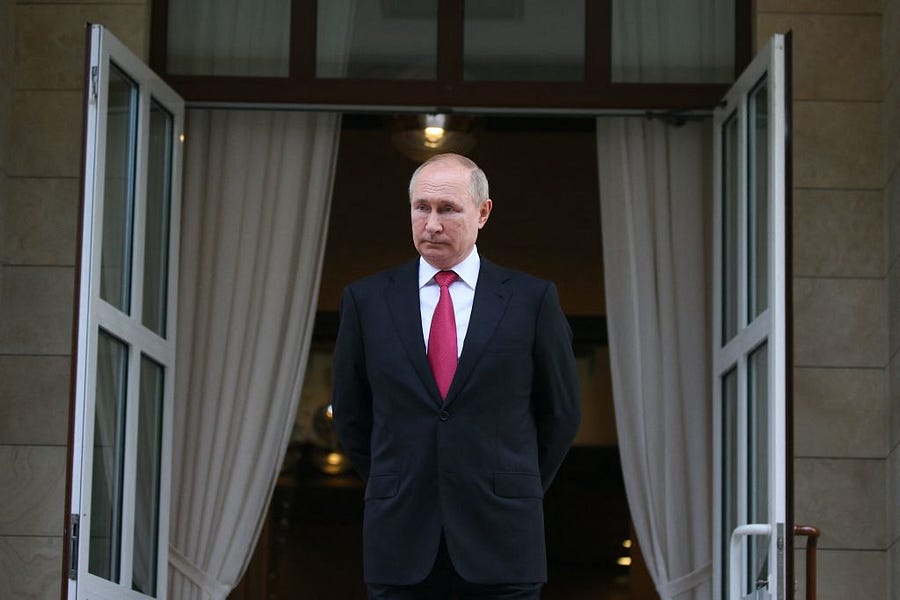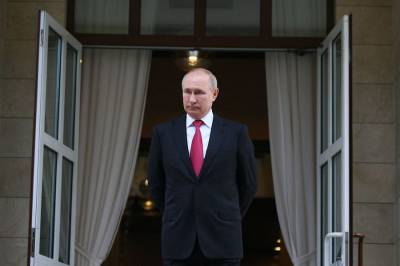Last Sunday’s newsletter was about Volodymyr Zelensky, Ukraine’s leader during the largest land war in Europe since World War II. In it, I tried to explain why Zelensky’s stand had resonated across the world. His moral and physical courage stands out in an age when so many politicians shrink from the moment, when they wilt under pressure, bowing to Twitter mobs rather than maintaining even an ounce of integrity in the face of adversity.
Zelensky is the uncommon hero, the entertainer-turned-president who is becoming the Winston Churchill of Ukraine. But this week, let’s talk about his enemy, Vladimir Putin: why he’s a common villain, and why men like him are ubiquitous in human history. They rise and fall with almost metronomic regularity, not just because there are always men who are drawn to absolute power and military glory, but because these men connect with specific human needs and unlock the darkness in human hearts.
It’s easy to forget as the western world unites in revulsion at Russia’s invasion, but as recently as ten days ago significant figures in the United States and the west obviously and openly admired Putin, including Donald Trump, the former president and frontrunner for the GOP nomination. Days before the Russian Army launched its unprovoked attack on Ukraine, Tucker Carlson, the most popular cable news host in America, was so pro-Putin that his remarks were rebroadcast on Russian state media.
In the years since his rise, Putin has been admired as a defender of Christian civilization, as a man at the “heart” of the “post-Soviet revival of Christianity in Russia.” In 2017 Christopher Caldwell, a senior fellow at the Claremont Institute, delivered an address to the Hillsdale College National Leadership Seminar, entitled “How to Think About Vladimir Putin.” Hillsdale, for those who don’t know, is arguably the premier conservative college in America. It reprinted Caldwell’s remarks in Imprimis, a monthly digest that reaches more than five million Americans.
Caldwell’s words are worth remembering because they describe—perhaps more eloquently than anyone else in the west—not just why Putin built a following abroad, but also how he became (at least for a time) popular at home. These three paragraphs are key:
Vladimir Vladimirovich is not the president of a feminist NGO. He is not a transgender-rights activist. He is not an ombudsman appointed by the United Nations to make and deliver slide shows about green energy. He is the elected leader of Russia—a rugged, relatively poor, militarily powerful country that in recent years has been frequently humiliated, robbed, and misled. His job has been to protect his country’s prerogatives and its sovereignty in an international system that seeks to erode sovereignty in general and views Russia’s sovereignty in particular as a threat.
After noting that Putin committed atrocities in his rise to power, Caldwell continues:
Yet if we were to use traditional measures for understanding leaders, which involve the defense of borders and national flourishing, Putin would count as the pre-eminent statesman of our time. On the world stage, who can vie with him? Only perhaps Recep Tayyip Erdoğan of Turkey.
When Putin took power in the winter of 1999-2000, his country was defenseless. It was bankrupt. It was being carved up by its new kleptocratic elites, in collusion with its old imperial rivals, the Americans. Putin changed that. In the first decade of this century, he did what Kemal Atatürk had done in Turkey in the 1920s. Out of a crumbling empire, he rescued a nation-state, and gave it coherence and purpose. He disciplined his country’s plutocrats. He restored its military strength. And he refused, with ever blunter rhetoric, to accept for Russia a subservient role in an American-run world system drawn up by foreign politicians and business leaders. His voters credit him with having saved his country.
As Caldwell notes in his essay, Putin’s fans have not been limited to right-wing figures outside Russia. One should view public opinion polls in authoritarian countries with deep suspicion, but the available evidence indicates he’s been broadly popular in Russia for two decades. One wonders how long this popularity can hold as Russian forces struggle on the battlefield, but the bottom line is still clear—tens of millions of people (including some of the most influential people in the west) have admired an objectively evil man. Why?
Throughout history we see familiar patterns, in times of stress and confusion, people cry out for salvation and strength. Success—including military success—builds a bond with the people. The victorious ruler connects not just with human pride, but also with profound human longings for protection, purpose, and identity.
This is an ancient need. One of the most fateful passages of scripture is found in 1 Samuel 8, the moment the people of Israel demand a king. Dissatisfied with the leadership of Samuel’s dissolute sons, they demanded a king “to judge us like all the nations.”
Samuel warned the people of the oppression to come (including, notably, his military demands), but they insisted, in words that have echoed to this day, “There shall be a king over us, that we also may be like all the nations, and that our king may judge us and go out before us and fight our battles.” (Emphasis added.)
I’ve long thought about an argument in Victor Hugo’s Les Misérables. The book records an exchange about Napoleon Bonaparte between Marius and Combeferre, two young revolutionaries, and Marius’s case for Napoleon feels relevant as Vladimir Putin longs for the glories of the Russian imperial past:
To cause constellations of victories to flash forth at each instant from the zenith of the centuries, to make the French Empire a pendant to the Roman Empire, to be the great nation and to give birth to the grand army, to make its legions fly forth over all the earth, as a mountain sends out its eagles on all sides to conquer, to dominate, to strike with lightning, to be in Europe a sort of nation gilded through glory, to sound athwart the centuries a trumpet-blast of Titans, to conquer the world twice, by conquest and by dazzling, that is sublime; and what greater thing is there?”
Putin inherited the husk of an empire, and in war after war, for year after year, he triumphed. He expanded the zone of Russian control. He replaced the lost Soviet identity with a renewed commitment to Russian greatness. While Putin’s victories weren’t as dramatic as Napoleon’s—Georgia and Crimea can’t compare to Jena and Austerlitz—war provides a terrible purpose, and victory creates remarkable pride.
The sobering reality is that we cannot look at Russia and simply shake our heads at “those people,” secure in the knowledge that we’re fundamentally different. Humans are fashioned from the same clay, and while our culture can provide some firewalls against authoritarianism, we’re still not far removed from a violent attempt to overturn an American election, led by a mob waving blue flags stamped with their leader’s name.
Of course, imperial authoritarianism isn’t the only ideology with the power to tug at hearts. In Les Misérables, Combeferre isn’t impressed by Marius’s vision of martial glory. What’s greater than the sublimity of conquest? “To be free,” he replies.
The first time I read Les Misérables, I distinctly remember being moved by Combeferre’s retort. I was naïve enough to see it as classical literature’s version of a mic drop—the words that settled the argument and ended the debate.
But Combeferre’s retort doesn’t end the argument. In fact, the debate never ends. There are those who see the ways in which human beings abuse liberty, or squander it in disorder and decadence, and are drawn to the order and direction of authoritarianism. In this formulation, freedom itself is the problem. It doesn’t provide purpose.
In more peaceful times, the “fight” between freedom and power is limited to words, to books and essays and debates. But now that fight rages on the battlefield in Ukraine. On the one side is the Russian Napoleon, seeking to build his empire, a man who has bonded to his people by appealing to their pride, imbuing them (for a time) with terrible purpose.
He casts a vision of a new Russian empire, a vision “to be in Europe a sort of nation gilded through glory,” bonded by religion, victorious in war, and demands to know, “What greater thing is there?”
“To be free,” respond the people of Ukraine. And so they take their place on the line, fighting the ancient battle against the ancient foe, the leader who unleashes the darkness in the hearts of men.
One more thing …
In this week’s Good Faith podcast, Curtis and I dive deep into the spiritual power of leadership, and the difference between imaging and idolatry. It’s a great conversation that detours into unexpected places. Give it a listen!
One last thing …
At the risk of being repetitive, I’m bringing back a song only a month after I first shared it. I’ve been listening to it on loop, in part because it refers to a moment in biblical history when God called a great city and a powerful king to repentance, and the city and king answered the call. Proverbs 21:1 says, “The king's heart is a stream of water in the hand of the Lord; he turns it wherever he will.” May he turn the heart of Russia’s modern tsar.







Please note that we at The Dispatch hold ourselves, our work, and our commenters to a higher standard than other places on the internet. We welcome comments that foster genuine debate or discussion—including comments critical of us or our work—but responses that include ad hominem attacks on fellow Dispatch members or are intended to stoke fear and anger may be moderated.
With your membership, you only have the ability to comment on The Morning Dispatch articles. Consider upgrading to join the conversation everywhere.